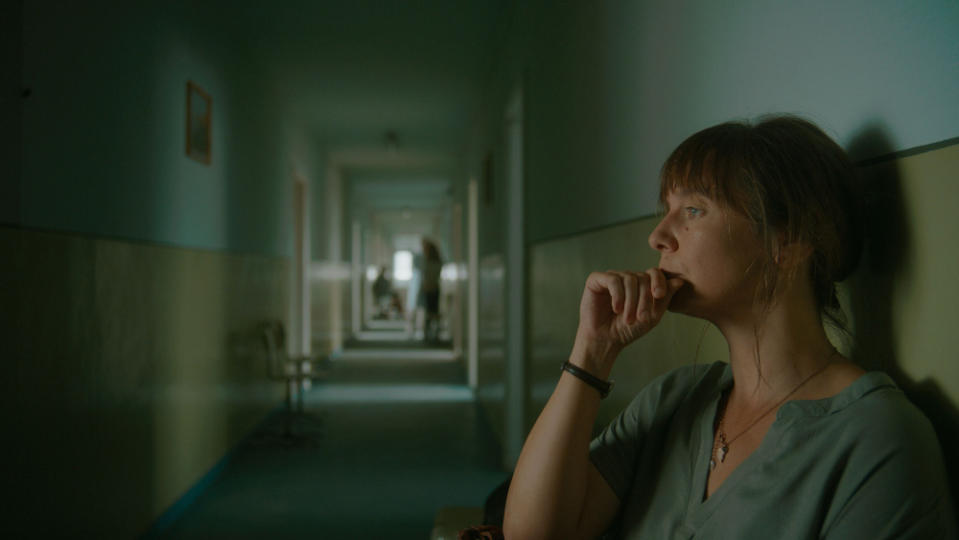Filmmakers Fight Back Against Deepening Chill in Viktor Orban’s Hungary: ‘People Have Nothing to Lose’
- Oops!Something went wrong.Please try again later.

On the surface, it looks like any other teenage love story: Abel, an absent-minded high-school student in Budapest, hopelessly pines for his best friend, Erika, dreamily staring out the classroom window when the teacher calls his name. On the day of his final exam, he draws a blank: Rather than bury his head in his history books, Abel’s had his head in the clouds.
But an off-hand comment by one of his examiners, about the tricolor ribbon pinned to his lapel — a nationalist symbol in Viktor Orbán’s Hungary — sparks a controversy that soon snowballs into a nationwide scandal. For Hungarian filmmaker Gábor Reisz, the director of “Explanation for Everything,” the debate cuts to the heart of a question that has increasingly dominated public discourse in his country since the rise of the right-wing prime minister: “Are you a real Hungarian?”
More from Variety
The film, which premieres in the Horizons strand of the Venice Film Festival, is something of an outlier for the Hungarian industry in recent years. Amid a growing crackdown on the press and free speech and the muzzling of opposition voices, Hungarian filmmakers have increasingly taken refuge in the past, whether in films such as Barnabás Tóth’s striking, Oscar-shortlisted Holocaust drama “Those Who Remained,” or in the growing wave of splashy, patriotic blockbusters like the forthcoming independence war drama “Now or Never!,” which look to valorize the country’s historical icons and celebrate its heroic past.
“The industry is completely split into two: big-budget, official state movies, and low-budget, [independent] movies, which are probably more exciting than the official movies,” says Tóth, whose latest feature, “Mastergame,” an intricate chamber piece set aboard a refugee train fleeing Budapest after the Russian invasion of 1956, premieres in Hungary in September. “Nobody dares to talk about politics in film and nobody dares to call things out by their name,” adds Reisz. “Everybody’s afraid.”

Another Hungarian production, which bows in the Discovery section of the Toronto Film Festival, likewise seizes on a moment of sharp political and cultural divides. “Without Air,” the debut of Romanian-born, Budapest-based director Katalin Moldovai, follows a high-school literature teacher whose career unravels due to a controversy over a film she recommends to her class: Polish filmmaker Agnieszka Holland’s historical drama “Total Eclipse,” about the erotically charged relationship between 19th-century French poets Arthur Rimbaud and Paul Verlaine.
“Without Air,” which is based on real events, is set among the ethnic Hungarian minority in Romania, although the director insists it “could have happened anywhere else in this Eastern European region, even in Hungary,” where anti-LGBTQ rhetoric has been a staple of the Orbán era. The film is a sobering case study of the chilling effect that sets in when a society is governed not by the open, free exchange of ideas, but by fear.
Critics say the state-backed National Film Institute (NFI), which last year ponied up $60 million to support the development and production of more than 100 projects, is partly responsible for the silencing of contrarian voices and controversial themes in the Hungarian film industry. The lion’s share of the NFI’s budget, they maintain, is doled out to lavish period productions such as “Now or Never!,” the recipient of a $12.5 million NFI production grant, or similar films that push a triumphalist, nationalist narrative.
Csaba Káel, Hungary’s film commissioner and chairman of the National Film Institute, pushes back, telling Variety that the NFI’s decisions are based on a range of factors including a film’s “distribution prospects, revenue predictions, cultural values, audience trends.” One example to support his claim could be the success of “Golden Legends,” Tamas S. Zákonyi’s documentary about the Hungarian Olympic champion men’s water polo team, which broke box office records this year, proving that local audiences do indeed turn out for local heroes.
Káel insists that he sees no need “to reflect positively on Hungary” as the institute’s head and points to an NFI-backed slate that includes the futuristic eco-dystopian animated feature “White Plastic Sky,” “Three Thousand Numbered Pieces,” which confronts the harsh realities of life among a troupe of Roma theater actors, and Moldavai’s “Without Air,” as proof that the funding body supports productions that tackle a range of subjects.
Many filmmakers nevertheless say they’re being shut out. That includes Reisz, who after having two previous scripts rejected by the NFI decided not to apply for state funding for “Explanation for Everything.” Instead, he and producer Júlia Berkes, along with a team of nearly 20 collaborators, financed the film independently and shot it over the course of three frantic weeks.
Though frustrated, Reisz is undeterred. “I would like to change the system — if it sounds a bit punk,” he says. “I think it’s the most important issue for an artist. Somehow, you have to be honest and try to make something [so that the country will] become a better place.”
Tóth, too, sees an upside in how a new generation of filmmakers is pushing back against the repressive climate in Orbán’s Hungary. “People have nothing to lose anymore,” he says. “You have to come up and speak about what we live in, openly. This is the only chance we have: to make honest movies.”
Best of Variety
Sign up for Variety’s Newsletter. For the latest news, follow us on Facebook, Twitter, and Instagram.

